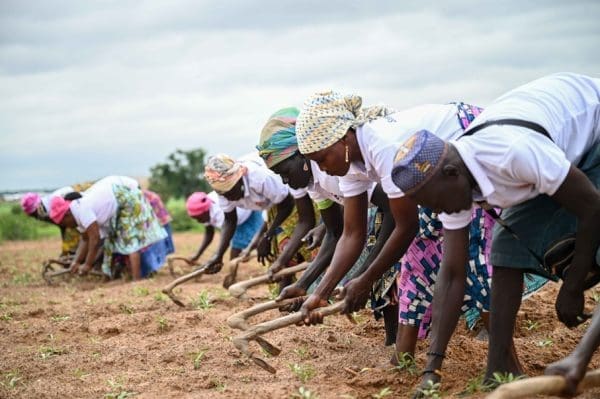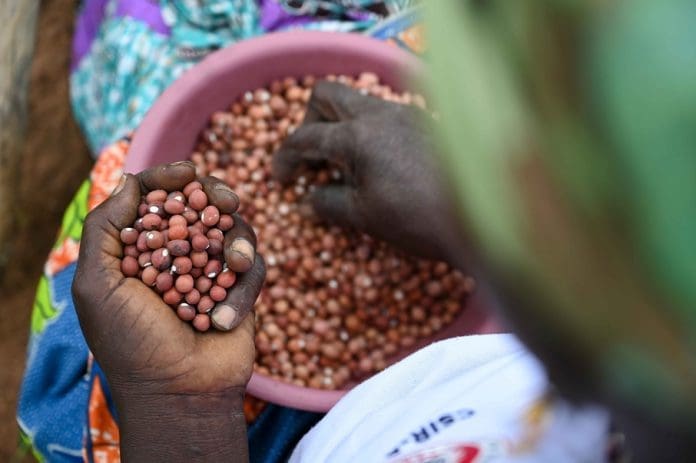Ghanaian farmers are experiencing unprecedented agricultural transformation through a groundbreaking collaboration with the national genebank, enabling access to diverse crop varieties that were previously beyond their reach.
The innovative partnership, established through germplasm user groups, has revolutionized how farmers obtain seeds for traditional crops like Bambara groundnut and indigenous leafy vegetables. About 90 percent of farmers in user groups said their access to crop diversity improved, giving them more tools to face drought, pests and extreme weather.
Previously, Ghanaian farmers typically had access to only limited varieties of indigenous crops through informal seed-sharing networks. Farmers tend to rely on the seeds they have stored from the previous season, swapping or trading them with others. Often, they’re not sure what they’re getting; a bag of seed might contain one or multiple landraces, and the quality can be hit-or-miss.
The new approach connects farmers directly with Ghana’s national genebank through structured user groups, where they test different seed varieties on their farms and provide feedback to researchers. This collaborative model has generated remarkable results across multiple crops.
Data from the program shows that genebank-supplied seeds for indigenous leafy vegetables and Bambara groundnut outperformed traditional varieties by up to 67 percent in harvest time. The improvement represents a significant breakthrough for farmers who have struggled with declining yields and limited seed options.
The impact extends far beyond individual farms. Research indicates that each participating farmer shares seeds with an average of four other farmers, creating a multiplication effect throughout rural communities. This organic distribution network ensures that improved varieties reach farmers who may not have direct genebank access.
Seeds for Resilience is a five-year project to support the national genebanks of Ethiopia, Ghana, Kenya, Nigeria and Zambia and has been instrumental in facilitating these farmer-genebank connections. The project represents a shift from traditional genebank operations that primarily served researchers and plant breeders.
Michael Bolton, the Crop Trust manager of the Seeds for Resilience project, emphasized the mutual benefits of this approach. The collaboration allows farmers to discover genebanks as valuable seed sources while enabling researchers to gather performance data under diverse field conditions.
The program has particular significance for Bambara groundnut, an indigenous African legume that serves as a crucial protein source but has received limited attention in formal breeding programs. There are currently no breeding programs targeting the development of improved cultivars from segregating families and therefore, to date, there are no registered or improved cultivars of Bambara groundnut.
Young professionals participating in the Genebank Impacts Fellowship Program have documented these transformational changes across five African countries. Their research reveals that user group members were 47 percent more likely than non-participants to view genebanks as important seed sources.
The fellowship program has provided hands-on experience in evaluating genebank impacts while building capacity among emerging agricultural professionals. Fellows conducted farmer surveys, led focus group discussions, and analyzed data that demonstrates the direct connection between crop diversity conservation and farmer livelihoods.
Tobias Okando Recha, a 2024 fellowship recipient from Kenya, described how working directly with farmers changed his perspective on agricultural resilience. The immersive research environment equipped fellows with theoretical frameworks and practical skills needed for comprehensive impact assessment.
Beyond improved seed access, farmers reported additional benefits including greater awareness of genebank activities and enhanced knowledge sharing with extension workers and fellow farmers. These secondary effects strengthen the entire agricultural knowledge system.
The success in Ghana reflects broader trends across sub-Saharan Africa, where national genebanks are transforming their operations to serve smallholder farmers more effectively. Similar programs in Kenya, Nigeria, Zambia, and Ethiopia have generated comparable improvements in crop diversity access and farmer outcomes.
Nelissa Jamora, the Crop Trust’s monitoring and evaluation manager, noted that many fellows enter the program without genebank backgrounds but quickly develop expertise in conducting research and analyzing agricultural data. The evidence they generate builds the case for continued genebank investment while deepening understanding of how conservation directly impacts users.
The Ghana model demonstrates how public investment in genebank infrastructure can efficiently support local agricultural resilience. By connecting farmers with preserved crop diversity, the program addresses both immediate productivity challenges and long-term food security concerns.

As climate change intensifies pressure on agricultural systems, access to diverse crop varieties becomes increasingly critical for farmer adaptation. The germplasm user group model provides a scalable approach for making conserved genetic resources available to those who need them most.
The program’s success suggests that traditional boundaries between conservation and utilization may be less relevant than previously assumed. When genebanks actively engage with farmers, conservation efforts become more dynamic and responsive to real-world agricultural challenges.
Looking forward, the expansion of user group networks across Ghana could significantly enhance the country’s agricultural resilience. The model’s demonstrated effectiveness in improving yields while preserving indigenous crops positions it as a valuable tool for sustainable agricultural development.
The collaboration between farmers, researchers, and genebank staff represents a new paradigm in agricultural research and development. By centering farmers as both users and generators of knowledge, the program ensures that conservation efforts remain grounded in practical agricultural reality.
This innovative approach to seed system strengthening offers valuable lessons for other African countries seeking to enhance agricultural productivity while preserving genetic diversity. The Ghana experience demonstrates that genebanks can serve as dynamic partners in farmer-led agricultural transformation rather than passive repositories of genetic material.
Source: newsghana.com.gh











